INSIDE ISSUE 18.42 | OCT. 18, 2019
BIG STORY: Economists warn of ‘softening’ state growth
NEWS BRIEFS: Plastic recycling, charter schools, abortion ban and more
COMMENTARY, Brack: Steyer is passionate, but rooted in pragmatism
SPOTLIGHT: AT&T
FEEDBACK: Send us your thoughts
MYSTERY PHOTO: Mystery statuary
 So we’ve got some pretty big news, in case you haven’t heard: Statehouse Report this week joined the Charleston City Paper, which was purchased by ShR founder Andy Brack and Georgetown attorney Ed Bell. Read the story.
So we’ve got some pretty big news, in case you haven’t heard: Statehouse Report this week joined the Charleston City Paper, which was purchased by ShR founder Andy Brack and Georgetown attorney Ed Bell. Read the story.
Brack, who now also is the new publisher of the award-winning, independent City Paper, will continue editing and publishing Statehouse Report every Friday. “The only big difference is that it is now a City Paper publication. We’ll continue to focus on politics and policies from the Statehouse that impact people across the state. And we’ll have a broader platform for some of our state coverage in the City Paper, which reaches more than 110,000 people per week in its print publication.”
- Not familiar with the alt-weekly City Paper? Check it out here — and sign up for its newsletters, too!
BIG STORY: Economists warn of ‘softening’ state growth

By Lindsay Street, Statehouse correspondent | South Carolina’s economy is expected to follow a national trend of softening growth into 2021, according to multiple economists advising the state’s three-member board that forecasts revenues for the state budget.
“It’s important for the BEA (Board of Economic Advisors) to take into account that the last year has been very strong in terms of our overall economic activity, and we need to be cautious because we are anticipating a bit of softening of growth,” University of South Carolina economist Joey Von Nessen told Statehouse Report.
The BEAs, which is part of the S.C. Revenue and Fiscal Affairs Office, will offer a November forecast that House lawmakers will use to begin writing the 2020-2021 state budget for the fiscal year that begins July 1, 2020. Every year, the BEA hears from economists around the state prior to making the forecast. On Thursday, Frank Hefner of College of Charleston, Raymond Sauer of Clemson University, Russell Sobel of The Citadel and Mark Vitner of Wells Fargo Securities joined Von Nessen in speaking to the board.
“We do our best to provide good information for them to make a decision for the budget in the coming year,” Von Nessen said.
BEA Chairman Edward B. Grimball of Edisto Island said the regional advisors “play an important role in our revenue forecasting.” The information from the outside economists will be taken into account alongside staff analysis and board members’ “own knowledge” in determining revenue forecasts, he said in a statement.
It’s a tricky business forecasting revenues for a year or two ahead. In boom times, an off-forecast could mean a surplus. South Carolina’s revenue forecast has been off by 2 percent and 4 percent over the last two years, which accounted for a $177 million surplus in the 2017-2018 budget and a $350 million surplus the following year. But in a recession, an inaccurate forecast could lead to mid-year budget cuts and other belt-tightening measures.
Clouds on the horizon
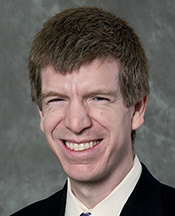
This year’s message from the economists: If the economy is like the weather, then it’s still sunny but now’s the time to pack the raincoat and make sure the car windows are rolled up.
South Carolina’s economy still appears to be humming along, Von Nessen, Sauer and Sobel told Statehouse Report. August’s job report for South Carolina showed a jobless rate of 3.2 percent, a tad lower than the national rate of 3.7 percent.The September job report will be due today after publication.
“We riding a pretty strong period of economic performance at least in terms of sustained economic growth, substantial gains in employment, the largest reduction in the unemployment rate since the Great Depression and solid average wage growth,” Sauer said. “All of that is a sign of a healthier economy than we might have expected if we were drawing up a forecast for the decade at the start of 2010.”
But clouds are on the horizon as exports drag, manufacturing slows, and uncertainty looms because of global trade policies. All of these factors have big implications in South Carolina.
“The most likely outcome is that we continue to grow,” Sobel said. He added that his main point on the S.C. economy is a “slight increase in risk and a slight decrease in growth.”
Uncertainty from national and global sources was a keyword among the economists. It affects investment and business decision.
“There’s a lot of uncertainty this year. Uncertainty is really the new normal, and countering economic forces are suggesting we will see slower growth in the new year,” Von Nessen said. “The probability of a recession is higher than it was this time last year.”
While a recession is possible, Von Nessen said there are factors that could be resolved — such as the ongoing trade disputes — and help the economy avoid a downturn.
Sobel said, “there’s no data that would suggest that” the economy is slipping into a recession, but “there’s a lot more uncertainty.”
Sauer said most economists around the nation are expecting a recession to begin in either late 2020 or into 2021.
Advice: ‘Don’t overextend’
The economists were not tasked with advising the BEA on how state lawmakers should draft the state budget in response to their forecast. But Statehouse Report asked Sauer, Sobel and Von Nessen how the state should respond to information of softening growth.
“‘Don’t overextend’ is the right way to look at it,” Sauer said, but he added the state has a huge liability hanging over its head: state employee pensions. He said the state needed to use times of growth to fund pensions fully, since it would be unlikely to fund them in a down economy. “They’re underfunded and this is a manifestation of the government not being able to establish priorities and keep commitments, and that’s where we have the most ground to makeup.”
Sobel said the state should avoid “undertaking any new major things … that aren’t totally necessary” in the 2020-2021 budget. He said it’s typical of state and local governments to spend too much during “good times” and not save enough for future recessions.
In South Carolina, where the budget took big hits in the recession, state spending on some programs still has not returned to pre-recession levels. One example of this is higher education spending.
“In boom times, we spend more on existing programs, and start a bunch of new ones. So what this creates is a situation where most states, including South Carolina, have to make big cuts during recessions when revenues fall,” Sobel said.
That said, Sauer said the state and the financial markets could be in a better position than prior to the Great Recession to weather any downturn. And Von Nessen felt that South Carolina’s weakness in its economy now — labor shortages — could prove to be strengths in a softening of growth.
“A slight softening from a labor perspective is something South Carolina can handle,” he said.
- Have a comment? Send to: feedback@statehousereport.com
NEWS BRIEFS
Plastic recycling, charter schools, abortion ban and more
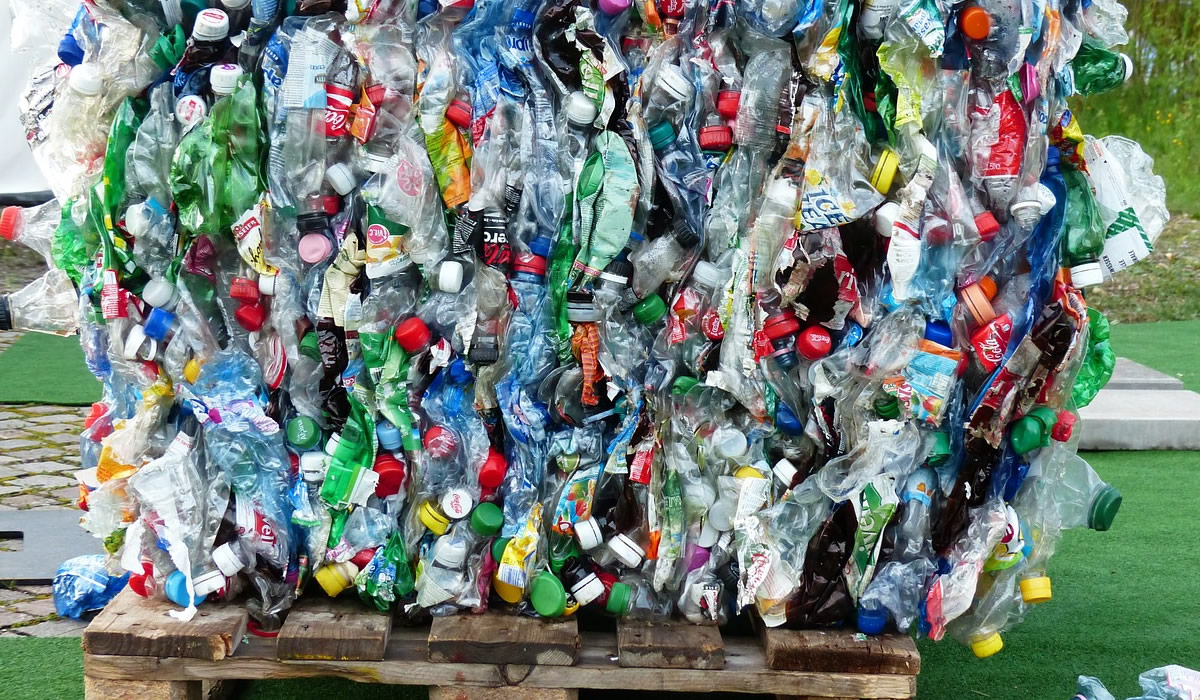
By Lindsay Street, Statehouse correspondent | Should recycling discarded plastic using a heat process to make new materials have less state oversight South Carolina?
A multi-state push by the American Chemistry Council seeks to re-classify recyclers of polymers using heat as “recovered materials,” facing fewer regulations and oversight than the current classification under “solid waste” with the S.C. Department of Natural Resources.
House Bill 4152 passed April 30 with a vote of 63-27. On Oct. 22, a Senate Medical Affairs subcommittee will take a crack at discussing the bill, which has alarmed environmentalists but has remained largely under the radar in South Carolina and other states, like Tennessee and Georgia, that have considered nearly word-for-word similar legislation. Advocates, such as House sponsor Rep. Bill Hixon, R-Aiken, say it would rid the state of a backlog of plastic waste and create jobs.
Hixon told Statehouse Report that he and other lawmakers met with the American Chemistry Council on multiple occasions, where he learned about the process that is taking place at a plant in downtown Atlanta.
“Everybody is complaining about what are we going to do with plastics … It’s an endless supply of the plastics, and listening to these people we thought it was a very safe and easy way to keep the plastics out of the landfill and turn it into fuel,” Hixon said. “It would be a great industry in South Carolina to come here and start gobbling up all the plastics in the state.”
But others remain skeptical of the process, which some say could release heavy metals into the environment.
S.C. Rep. Mandy Powers Norrell, D-Lancaster, voted against the bill and spoke out about in the House floor in April. She said the bill is being pushed as being environmentally friendly, but that research shows the heating process used to break down polymers is potentially more dangerous for the environment than leaving the plastics in the landfill.
“It’s something we should be concerned about; it should scare us in a way that a lot of legislators throughout South Carolina and the Southeast are not picking up on,” she said.
The Senate panel meets 2 p.m. Oct. 22 in room 308 of the Gressette building at the Statehouse in Columbia. Agenda.
In other news:
![]() Charter school accountability update. An ad-hoc legislative committee will hear recommendations — including accountability measures — Oct. 21 to update a 20-year-old law that governs public charter schools in the state.
Charter school accountability update. An ad-hoc legislative committee will hear recommendations — including accountability measures — Oct. 21 to update a 20-year-old law that governs public charter schools in the state.
Public charter school attendance has grown by 78 percent over the last four years. In the 2019-2020 school year, there are an estimated 32,701 students enrolled. The state has also seen its first higher-education sponsor for charter schools with Erskine College taking that role in 2017.
Kayla Audette, an education associate in the Office of School Transformation for the S.C. Department of Education, told Statehouse Report that there wasn’t a single “catalyst” in working on the updates. For example, the law includes out-dated references to the federal No Child Left Behind law. But she added, “these updates would provide a little more enforcement.”
“It will allow (the Department of Education) to hold everybody a little more accountable because right now statitorily we do not have that power,” Audette said.
Awendaw charter school advocate Joe Bowers, director of operations of the S.C. Charter School Alliance, said the new recommendations will establish a minimum standard for accountability, provide minor updates to language to reflect changes in technology or other laws, and provide guidance for charter school closures so students are able to enroll in other schools.
“More strength and more accountability for everyone involved,” he said.
The meeting is 1 p.m. Oct. 21 in room 433 of the Blatt building at the Statehouse in Columbia. See the agenda here.
Abortion ban returns to Senate panel. A Senate Medical Affairs subcommittee will discuss banning abortions after a fetal heartbeat is detected. The meeting is 10 a.m. Oct. 22 in room 308 of the Gressette building at the Statehouse in Columbia. See the agenda here.
Senate education funding study committee meets. The Senate Education Funding Reform Study Committee will hold its first meeting 10 a.m. Oct. 23 in room 308 of the Gressette building at the Statehouse in Columbia. The committee will review the mechanics and methodology of the state’s education funding formula to determine what revisions and refinements are necessary to provide increased flexibility needed at the district level, while meeting the state’s objectives. See the agenda here.
Interstate panel looks at widening projects. The Special Interstate subcommittee in the Senate met this week to review more than $1 billion in interstate widening projects. Read more.
Mold remediation regulation mulled. State lawmakers are looking at drafting regulations of the mold remediation industry in South Carolina. Currently, no state agency regulates it. Read more.
Limehouse, Vick eye positions on PSC. Of the 21 announced candidates for Public Service Commission seats next year, two are ex-lawmakers: Charleston Republican Chip Limehouse, who served in the House 1994-2016; and Pawleys Island Democratic Ted Vick, who served in the House 2004-2014. Read more.
2020 candidate calendar
 Throughout the campaign season, we are working to keep South Carolina informed of candidate events in the state. Have an event you want us to know about? Email us at 2020news@statehousereport.com.
Throughout the campaign season, we are working to keep South Carolina informed of candidate events in the state. Have an event you want us to know about? Email us at 2020news@statehousereport.com.
Cookoff to host 3 Democratic presidential candidates. The Betty Henderson Elected Officials Cook-off in Orangeburg will host U.S. Sens. Cory Booker of New Jersey and Kamala Harris of California, and billionaire investor Tom Steyer 6 p.m. Oct. 18 at the Orangeburg County Fairgrounds. More info.
Homecoming at S.C. State features Steyer, Harris. Investor Tom Steyer and California Sen. Kamala Harris will make an appearance at 11:30 a.m. Oct. 19 at S.C. State University’s homecoming. More info.
Harris makes multiple stops this weekend. California Sen. Kamala Harris will host a town hall 4:45 p.m. Oct. 19 at Aiken High School in Aiken (more info), attend church services at 8 a.m. Oct. 20 at Brookland Baptist Church in West Columbia (no remarks will be given during the service), and talk shop 1:45 p.m. Oct. 20 at No Grease Barbershop in Columbia.
Booker returns to South Carolina New Jersey Sen. Cory Booker will attend a Conversation with Cory 9:30 a.m. Oct. 19 in Darlington County, a meet and greet at noon Oct. 19 at Nazareth AME Church in Johnsonville, a Conversation with Cory 2 p.m. Oct. 19 at The Beeson Building in Mullins, and another Conversation with Cory 5 p.m. in Georgetown County. More info.
- Have a comment? Send to: feedback@statehousereport.com
BRACK: Steyer is passionate, but rooted in pragmatism
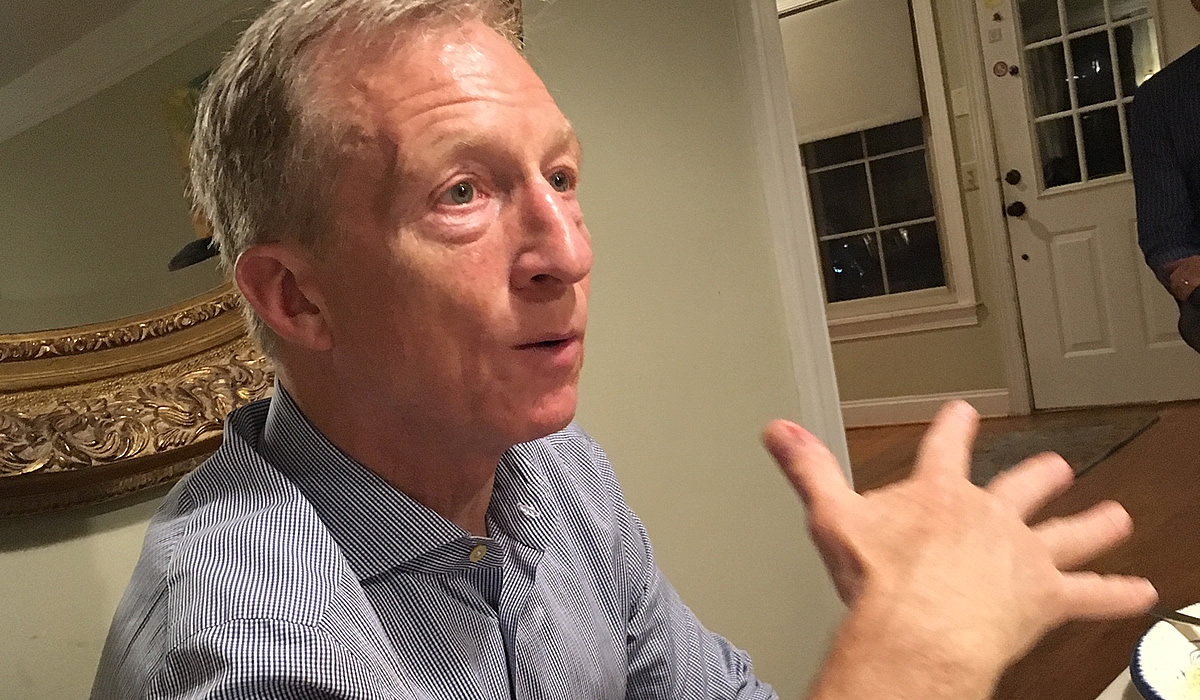
By Andy Brack, editor and publisher | It’s been two weeks since Tom Steyer came over for supper.
On a campaign swing through Charleston, the billionaire presidential candidate sat down with a few people to eat Rodney Scott’s awesome barbecue and ribs and have a beer. Well, he actually had one glass of wine. He is, after all, from California.
 I didn’t intend to write about this visit because I didn’t want it to seem like an ad for a guy running for the Democratic nomination. (I still don’t know who I’ll vote for in the February primary; there is no GOP primary, so I won’t be voting in that one.)
I didn’t intend to write about this visit because I didn’t want it to seem like an ad for a guy running for the Democratic nomination. (I still don’t know who I’ll vote for in the February primary; there is no GOP primary, so I won’t be voting in that one.)
After thinking long and hard about Steyer’s visit, it seemed that to not write about it would be a disservice for readers who may wonder about the Trump-obsessed guy running all of the ads on television.
In three words, Steyer is enigmatic, passionate and pragmatic.
Upon arrival, he got out of a car, yanked off a tie and barrelled into the den, stained shirt, colorful belt and all. He engaged with guests, not with a kingly, sweeping manner, but intimately as if each person with whom he was talking was the only person on the planet. He took time to have a brief, but deep discussion with my 16-year-old daughter (and all parents know how difficult that can often be.) He listened to her, responded and asked questions. It was a conversation, not talking points.
Then he stepped away from the voters in the room to make a 20-second video my other daughter, who was sick with a stomach bug. He started wryly. “Ellie, it’s Tom Steyer. Your dad tells me you may have seen me on TV.” (Understatement of the year for anyone in South Carolina who watches television.) After a word on how he is trying to unseat President Trump, he smiled, “Get better and next time I’m here, I’m gonna give you a big hug.”
That video, plus the one-on-one listening and engagement with guests, showed humor and authenticity, which is missing from too many slick, pre-packaged candidates who run for everything from Statehouse to Congress.
What really impressed most guests, some of whom didn’t know much about Steyer other than how he’s bankrolled the Need to Impeach movement for the last two years, was how he didn’t pull punches and answered any questions thrown at him.
Steyer emphasized how the climate truly is in crisis. But that crisis, he said, offers a huge opportunity for Americans to use their ingenuity, competitiveness and innovation to create change and build long-term prosperity.
“Stop telling me about your political philosophy and start talking to me about the numbers and the safety,” he said in a recent interview with the Atlanta Journal-Constitution that included a question about nuclear plant construction. “There are easy (clean energy) bets to make that are safe. There’s never been a solar spill. There’s never been a wind disaster.”
Today’s generation, he said, can be the new greatest generation by turning around climate change and, in the process, creating 4.6 million new jobs and restoring America’s position of global economic prominence.
In short, he said we can fix the problem by using our brains — and that such an effort was a noble aspiration that would pay long-term dividends. Building prosperity — a word he used a lot — would lead to social improvement and restore democracy.
“Listen, I think most Americans don’t know me,” he said recently. “What I’d like to do is introduce myself and explain what I think the future can look like for America in a positive way. If I do those two things, mission accomplished.”
Now at only 1 or 2 percent in most polls, Steyer addressed a national audience for the first time as one of 12 candidates in a recent debate. He also believes boosting turnout will propel a Democrat into the White House.
Guests at the dinner encouraged Steyer to share his passions about solving the climate crisis, helping restore the American dream, building prosperity and fighting for social justice solutions for people who are struggling rather than continue to dump on Trump.
If you’ve seen recent ads, he seems to be spending his millions to do just that.
Andy Brack’s latest book, “We Can Do Better, South Carolina,” is now available in paperback and for Kindle via Amazon.
- Have a comment? Send to: feedback@statehousereport.com.
AT&T
 The public spiritedness of our underwriters allows us to bring Statehouse Report to you at no cost. Today’s featured underwriter is AT&T Inc.
The public spiritedness of our underwriters allows us to bring Statehouse Report to you at no cost. Today’s featured underwriter is AT&T Inc.
AT&T Inc. (NYSE:T) helps millions around the globe connect with leading entertainment, mobile, high speed Internet and voice services. We’re the world’s largest provider of pay TV. We have TV customers in the U.S. and 11 Latin American countries. We offer the best global coverage of any U.S. wireless provider*. And we help businesses worldwide serve their customers better with our mobility and highly secure cloud solutions.
- Additional information about AT&T products and services is available at http://about.att.com.
- Follow our news on Twitter at @ATT, on Facebook at http://www.facebook.com/att and YouTube at http://www.youtube.com/att.
* Global coverage claim based on offering discounted voice and data roaming; LTE roaming; voice roaming; and world-capable smartphone and tablets in more countries than any other U.S. based carrier. International service required. Coverage not available in all areas. Coverage may vary per country and be limited/restricted in some countries.
- Have a comment? Send to: feedback@statehousereport.com
Send us your thoughts … or rants
We love hearing from our readers and encourage you to share your opinions. But you’ve got to provide us with contact information so we can verify your letters. Letters to the editor are published weekly. We reserve the right to edit for length and clarity. Comments are limited to 250 words or less. Please include your name and contact information.
- Send your letters or comments to: feedback@statehousereport.com
Mystery statuary
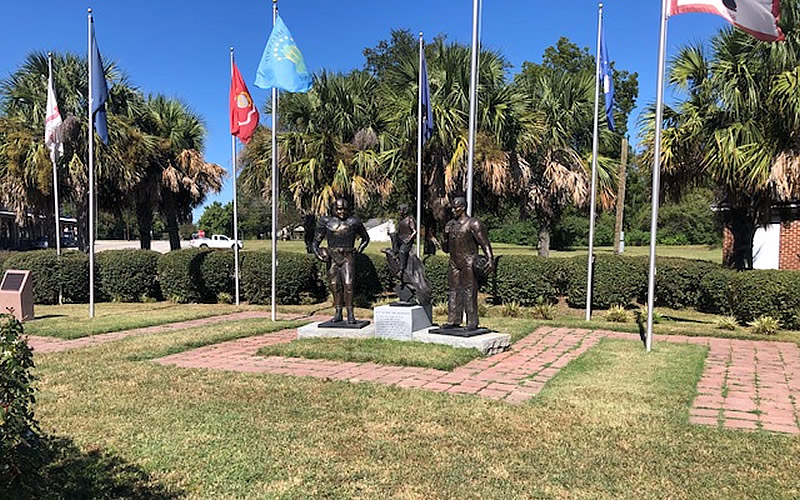
A reader who solves a lot of Mystery Photos sent this image to challenge fellow sleuths. Only clue: It’s in South Carolina. Send your guess about the location of this photo to feedback@statehousereport.com. And don’t forget to include your name and the town in which you live.
Our previous Mystery Photo
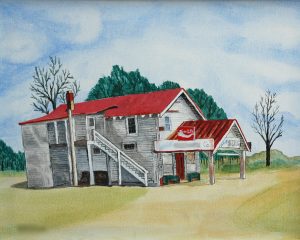 We got a lot of guesses from readers for our Oct. 11 mystery, “Painting of a South Carolina scene.” To many readers — and us — it looks like similar buildings in Santee, Andrews, Kingstree and other parts of the state. But the painting by Don Taylor shows Sandhill Mercantile Company on U.S. Highway 378 near Eastover. Thanks to Don’s son David, who lives in Darlington, for sending in the mystery.
We got a lot of guesses from readers for our Oct. 11 mystery, “Painting of a South Carolina scene.” To many readers — and us — it looks like similar buildings in Santee, Andrews, Kingstree and other parts of the state. But the painting by Don Taylor shows Sandhill Mercantile Company on U.S. Highway 378 near Eastover. Thanks to Don’s son David, who lives in Darlington, for sending in the mystery.
Forty percent of the five people who correctly identified this week’s mystery are from Camden. Hats off to Lonnie Godsey and Robert Ariail, both of Camden, as well as Helen Foley of Columbia, George Graf of Palmyra, Va., and Steve Skardon of Mount Pleasant.
Graf provided some more information that came from a Facebook post by a preservation group:
“The former home to the old country store found on Hwy 378 between Columbia and Sumter will be brought back to life with a new purpose thanks to the watchful eyes of the Palmetto Trust. The Sandhill Mercantile store, as it was known in its prime, was recently donated to the Trust by Maria and Evan Kostorizos. This pre-Depression era country store was active until the mid-1980s, and has fallen into disrepair. Since that time, the structure has aged and was scheduled for condemnation and demolition.
The two siblings wanting to honor their family legacy were elated when Executive Director Mike Bedenbaugh expressed interest in what he describes as on icon of rural South Carolina. …
“As fate would have it, Gwen and Vic Latuka from Columbia were eager to have the opportunity to revive the old store and put it to new use selling organic products that Gwen creates for sale. In exchange, the Latukas will donate a portion of the proceeds from sales of the products to the Palmetto Trust.”
- UPDATE: Unfortunately, the building no longer exists, according to David Taylor: “Sadly, the building was completely destroyed by arson not long after the decision to renovate it.” More: Sumter Item.
- Send us a mystery: If you have a photo that you believe will stump readers, send it along (but make sure to tell us what it is because it may stump us too!) Send to: feedback@statehousereport.com and mark it as a photo submission. Thanks.
ABOUT STATEHOUSE REPORT
Statehouse Report, founded in 2001 as a weekly legislative forecast that informs readers about what is going to happen in South Carolina politics and policy, is provided to you at no charge every Friday.
Meet our team
- Editor and publisher: Andy Brack, 843.670.3996
- Statehouse correspondent: Lindsay Street
Buy the book
Now you can get a copy of editor and publisher Andy Brack’s We Can Do Better, South Carolina! ($14.99) as a paperback or as a Kindle book ($7.99). The book of essays offers incisive commentaries by editor and publisher Andy Brack on the American South, the common good, vexing problems for the Palmetto State and interesting South Carolina leaders.
More
- Mailing address: Send inquiries by mail to: P.O. Box 22261, Charleston, SC 29407
- Subscriptions are free: Click to subscribe.
- We hope you’ll keep receiving the great news and information from Statehouse Report, but if you need to unsubscribe, go to the bottom of the weekly email issue and follow the instructions.
- © 2019, Statehouse Report. All rights reserved. Statehouse Report is a publication of the Charleston City Paper.


